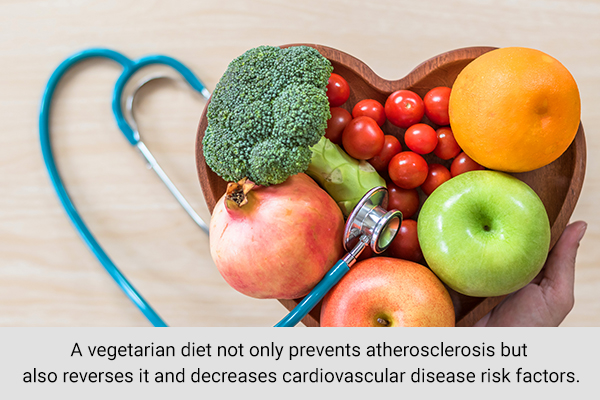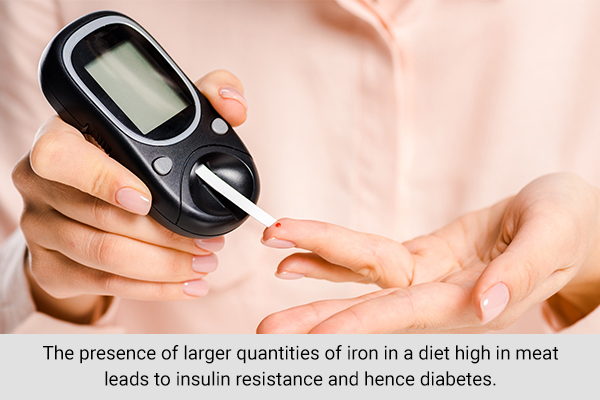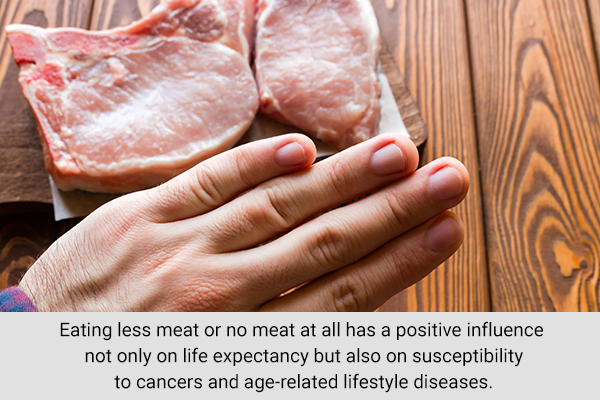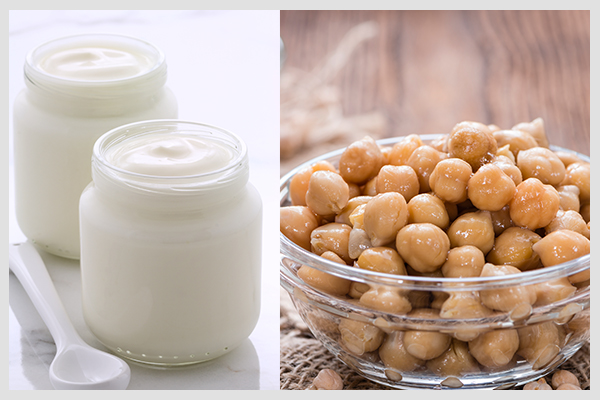In this article:
Meat is a source of proteins and many other nutrients including vitamins A, B1, B12, niacin, iron, zinc, and other micronutrients. However, recent research suggests that meat consumption, especially red meat, may adversely affect health, (1) and switching to a plant-based diet has many perks health-wise.

So, how does your body benefit when you stop eating meat? Many health advantages are associated with a meatless diet. Read on to know more about it.
Benefits of a Meatless Diet
The following things happen in your body when you go plant-based.
1. Promotes a healthy gut
Bacteria are present in the gut microenvironment and are called “normal flora of the intestine/gut” or the “gut microbiome.” The normal flora is unique to each individual, and the metabolites produced by the gut microbiome, such as short-chain fatty acids and vitamin B12, are useful to the host.
The composition of your gut microbiome is influenced by your diet. This, in turn, affects disease risk. A vegetarian diet has been shown to have a favorable effect on the gut microbiome and the associated cardiometabolic risk. (2)
Most importantly, the levels of the gut-microbial metabolite trimethylamine N-oxide (TMAO), which has been associated with coronary atherosclerosis, are reduced when you take a vegetarian diet rather than one that has high meat content. (3)
2. Supports heart health

A vegetarian diet not only prevents atherosclerosis but also reverses it and decreases cardiovascular disease (CVD) risk factors. A recent study has shown that a vegetarian diet reduces mortality due to CVD and the risk of coronary heart disease (CHD) by at least 40%. (4)
3. Reduced risk of stroke
Hypertension is an important contributing factor to strokes. Recent research has shown that a vegetarian diet controls blood pressure and thereby reduces the risk of stroke. (5)
4. Lowered risk of arthritis
Giving up meat may alleviate symptoms of arthritis.
A recent study found that using whole cereals and plant-based foods to feed patients with osteoarthritis resulted in a considerable reduction of joint pain. This was attributed to the reduction in inflammation-causing metabolites (such as arachidonic acid), which are produced in large quantities when an animal diet is ingested but are not produced when a vegetarian/plant-based diet is taken. (6)
Similar effects of a plant-based diet in reducing joint pain have been reported in the case of rheumatoid arthritis. (7) The mechanism of action here also appears to be the lowering of production of inflammation-causing metabolites.
5. Lowers risk of diabetes

An animal diet increases the lipid load in your body, causing insulin resistance, thereby increasing the risk of type 2 diabetes. Additionally, the presence of larger quantities of iron in a diet high in meat again leads to insulin resistance and hence diabetes.
Hence, a meatless diet is associated with a lowered risk of diabetes. (8)
6. Promotes better sleep
A recent study has shown that higher consumption of red meat and unprocessed red meat is associated with a higher incidence of insomnia. (9)
Substituting with a plant-based diet improves sleep quality and duration. The sleep-promoting properties of a plant-based diet may be attributed to the presence of isoflavones in legumes and beans. (10)
7. Great skin health
A recent study has associated an increased risk of melanoma with the consumption of red meat and processed meat. (11)
A vegetarian diet is rich in vitamins and antioxidants such as tocopherol (vitamin E), beta carotene (vitamin A), polyphenols, and phenolic acids. These contribute to delays in the aging process and the promotion of the structural support of the skin.
Moreover, many studies have associated higher intakes of select fruits and vegetables with improved skin health. (12)
8. Increased life expectancy

The life span or longevity and susceptibility to lifestyle diseases and certain cancers in any individual human being are determined by the length of the ends of the DNA (genetic material). These ends of the DNA are called “telomeres.”
With each cell division as the cell ages, the telomeres shorten, and after a critical length is reached, the process of death sets in, and there is also an increased susceptibility to certain cancers and lifestyle diseases such as cardiac diseases and diabetes. Hence, it may be loosely said that telomere length is a major factor in determining your life span and general health.
Recent evidence suggests that telomere length is influenced by certain foods that you consume. The chief among these foods is red meat. Regular consumption of red meat results in the shortening of telomeres over a shorter period. This could trigger death at a younger age, thus lowering life expectancy, increasing susceptibility to certain cancers, and increasing the risk of age-related lifestyle diseases. (13)
Eating less meat or no meat at all has a positive influence not only on life expectancy but also lowers your susceptibility to cancers and age-related lifestyle diseases such as cardiac diseases and diabetes.
9. Reduces risk of certain cancers
Consumption of animal meats such as ham is associated with an increasing incidence of certain cancers such as colorectal cancer, gastrointestinal cancer, and esophageal cancer. This is due to the presence of carcinogenic compounds called heterocyclic amines and the availability of larger quantities of iron in animal-based diets, which promote cancers of the gastrointestinal tract. (14)
A meatless diet is associated with a lesser risk of colorectal and gastrointestinal cancers.
Most-Asked Questions About Switching to a Meatless Diet
What are the side effects of giving up meat?

You may experience a zinc deficiency if you give up meat. This may lead to impaired immunity, hair loss, and diarrhea.
So, if you have stopped eating meat and experience any of the above symptoms, see that you include zinc-rich foods such as yogurt and chickpeas in your diet. Alternatively, you can take dietary zinc supplements.
Additionally, if you are looking to move toward a vegetarian diet, you can do so slowly. This will help alleviate cravings and make it less difficult to follow the diet.
Do you lose weight when you stop eating meat?
Yes, giving up meat can lead to some weight loss due to a reduction in calories. So, don’t be alarmed if your clothes become a little bit looser after you stop eating meat.
However, you can put it all back if your vegetarian diet consists of fried foods, high amounts of sugar, and processed foods.
Final Word
Substituting a meat-based diet with a plant-based vegetarian diet can have many health benefits such as a lowered risk of cardiovascular diseases, protection from certain types of cancers, and a healthy gut.
If you want to switch over to a vegetarian diet, gradually do so. Starting with an entirely plant-based meal once or twice a week, or replacing one animal product with a plant-based one, is advisable. It is also sensible to speak to your dietitian before making significant changes in your diet.
In some cases, it would be recommended to take iron and vitamin supplements to help the body get used to the new dietary regimen.
- Was this article helpful?
- YES, THANKS!NOT REALLY


